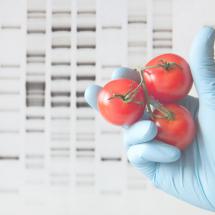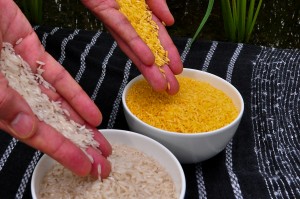Labelling of GMOs: A backgrounder & what do you think?
Introduction
Genetically modified (GM) foods are widespread in Canada, with the potential for further expansion. Though the majority of studies show no negative health effects from consuming GM foods, there is controversy regarding the validity of these studies, and many significant concerns and unanswered questions regarding their effects on the environment.
Background
 Genetic Modification (GM) refers to the introduction of new traits to an organism in a way that does not occur naturally, by making changes to its genetic makeup through intervention at the molecular level.
Genetic Modification (GM) refers to the introduction of new traits to an organism in a way that does not occur naturally, by making changes to its genetic makeup through intervention at the molecular level.
The first GM crops were approved for sale in Canada in the mid 1990s, and they have since become pervasive: they are found in more than 70% of processed foods sold in North America. More than 90% of canola and sugar beets, 80% of corn and 60% of soy grown in Canada are genetically engineered.
While genetic modification can be undertaken for a variety of purposes, including nutrition improvement, virus resistance, and drought resistance, virtually all GM crops on the market today are engineered exclusively for herbicide tolerance or insect resistance.
 Herbicide tolerant crops have been engineered to withstand application of herbicides: most common is Monsanto’s “Roundup Ready” corn, which tolerates glyphosate. Crops engineered for insect resistance produce their own pesticides. The most common are Bt crops, such as Bt Cotton and Bt Corn, which are engineered to synthesize Bacillus thuringiensis (Bt) endotoxin in their cells, making them toxic to some insects. Many GM crops are “stacked” with both herbicide tolerance and insect resistance.
Herbicide tolerant crops have been engineered to withstand application of herbicides: most common is Monsanto’s “Roundup Ready” corn, which tolerates glyphosate. Crops engineered for insect resistance produce their own pesticides. The most common are Bt crops, such as Bt Cotton and Bt Corn, which are engineered to synthesize Bacillus thuringiensis (Bt) endotoxin in their cells, making them toxic to some insects. Many GM crops are “stacked” with both herbicide tolerance and insect resistance.
 There is a strong “right to know” movement advocating mandatory labelling of GM foods in the US and Canada. Polls show that 90% of Canadians support mandatory labeling, and 64 countries around the world have mandatory labelling. Going further, some countries have banned the cultivation of GMOs altogether. Some US states have passed mandatory labelling laws, but a bill is currently under consideration in the US Senate, which would mandate that any such labelling takes place only at the Federal level, and only if health and safety is shown to be at issue.
There is a strong “right to know” movement advocating mandatory labelling of GM foods in the US and Canada. Polls show that 90% of Canadians support mandatory labeling, and 64 countries around the world have mandatory labelling. Going further, some countries have banned the cultivation of GMOs altogether. Some US states have passed mandatory labelling laws, but a bill is currently under consideration in the US Senate, which would mandate that any such labelling takes place only at the Federal level, and only if health and safety is shown to be at issue.
Some of the Key Issues
GMO foods have been widely consumed for 20 years. The majority of scientific studies undertaken suggest no negative health effects from consuming GMOs (see here and here). However, there are a number of criticisms aimed at these studies, including their short-term nature and the fact that industry funds a large proportion of them.
 Some studies have shown negative health effects of GM foods, including toxicity, immune responses, hormonal effects, and allergenicity, but their results are also contentious within the scientific community. Many of the studies showing negative health effects focus on the effects of glyphosate, which the World Health Organization has listed as a probable human carcinogen, and Bacillus thuringiensis (Bt), which are present in GM crops but are also used in conventional, and, in the case of Bt, organic agriculture. It is debated whether the levels at which Bt is found in GM crops are higher or lower than in conventional or organic crops, and whether there are qualitative differences in Bt, with human health and environmental implications, depending on how it is used.
Some studies have shown negative health effects of GM foods, including toxicity, immune responses, hormonal effects, and allergenicity, but their results are also contentious within the scientific community. Many of the studies showing negative health effects focus on the effects of glyphosate, which the World Health Organization has listed as a probable human carcinogen, and Bacillus thuringiensis (Bt), which are present in GM crops but are also used in conventional, and, in the case of Bt, organic agriculture. It is debated whether the levels at which Bt is found in GM crops are higher or lower than in conventional or organic crops, and whether there are qualitative differences in Bt, with human health and environmental implications, depending on how it is used.
The environmental effects of GM crops are a second key issue. Herbicide resistant plants – so-called “super weeds” – are on the rise, resulting from the widespread use of herbicides, particularly glyphosate. Herbicide use has increased significantly since the advent of GM crops; one study estimates a 15-fold increase between 1996, when glyphosate-resistant crops were introduced, to 2014. Many draw a direct link between herbicide-resistant GM crops and the increase in herbicide use (see here and here, for example). In response to weed resistance to glyphosate, chemical companies are developing new herbicides and engineering crops to resist them, such as 2,4-D resistant corn and soybeans, grown with Dow’s Enlist Duo, which combines herbicides 2,4-D and Glyphosate.
 The other major GM crop, modified with Bt to resist insects, has led to a reduction in the use of chemical insecticides in the US (the Canadian government does not track the impact of Bt crops on insecticide use). However, it is debated whether the GM plants have more or less pesticides present than those used in conventional or organic agriculture. Furthermore, since Bt has been used so widely in GM crops, insects are becoming resistant to it, thus farmers may have to switch to other, more toxic pesticides (see here, here and here).
The other major GM crop, modified with Bt to resist insects, has led to a reduction in the use of chemical insecticides in the US (the Canadian government does not track the impact of Bt crops on insecticide use). However, it is debated whether the GM plants have more or less pesticides present than those used in conventional or organic agriculture. Furthermore, since Bt has been used so widely in GM crops, insects are becoming resistant to it, thus farmers may have to switch to other, more toxic pesticides (see here, here and here).
In terms of contamination, GM crops have the ability to contaminate organic farms, which prohibit the use of genetic modification, thereby making organic farming difficult or impossible in regions close to GM agriculture. There is a largely unknown risk of transgene transference from GM crops to wild gene pools: some instances of transference have been reported, but the extent and future potential is unknown.
A Canadian expert panel put together by the Royal Society of Canada noted that the uncertain environmental impacts of GM crops could justify mandatory labeling. Independent research is lacking, as research is primarily funded by industry. The Canadian government doesn’t undertake an independent review process of industry studies on the health and environmental safety of their products before approving them.
 Underlying discussions of the health and environmental effects of GM crops is a problem with treating GMOs categorically. Genetic modification is a process that can be used for different purposes and to a wide variety of effects. As noted, while herbicide resistant GM crops are associated with increased herbicide use, pesticide producing GM crops, such as Bt crops, have reduced the use of chemical insecticides. Genetic modification can potentially improve nutrition, such as “Golden Rice” with vitamin A added, or GM potatoes that release fewer carcinogenic acrylamides when cooked; it can make crops virus resistant, by inserting virus proteins into the DNA, as with the GM papaya; and it can help plants become drought resistant, potentially improving global food security. A key point of criticism of mandatory labelling is that it does not differentiate between the types of modification taking place, and their associated effects on human health or the environment.
Underlying discussions of the health and environmental effects of GM crops is a problem with treating GMOs categorically. Genetic modification is a process that can be used for different purposes and to a wide variety of effects. As noted, while herbicide resistant GM crops are associated with increased herbicide use, pesticide producing GM crops, such as Bt crops, have reduced the use of chemical insecticides. Genetic modification can potentially improve nutrition, such as “Golden Rice” with vitamin A added, or GM potatoes that release fewer carcinogenic acrylamides when cooked; it can make crops virus resistant, by inserting virus proteins into the DNA, as with the GM papaya; and it can help plants become drought resistant, potentially improving global food security. A key point of criticism of mandatory labelling is that it does not differentiate between the types of modification taking place, and their associated effects on human health or the environment.
 Mandatory labelling has a significant amount of public and political support, advertised as a means to give customers the ability to know what they are eating. The effect of mandatory labelling on consumer demand is debated: some argue that it will be widely perceived as a warning, thereby decreasing consumer demand for GM products. In response to consumer demand it is predicted that producers will shift away from GM products and source non-GM ingredients. The costs of labelling to the consumer in Canada are debated, but a large study in the US estimated that mandatory labelling would cost US$2.30 per person annually, not incorporating potential behaviour changes.
Mandatory labelling has a significant amount of public and political support, advertised as a means to give customers the ability to know what they are eating. The effect of mandatory labelling on consumer demand is debated: some argue that it will be widely perceived as a warning, thereby decreasing consumer demand for GM products. In response to consumer demand it is predicted that producers will shift away from GM products and source non-GM ingredients. The costs of labelling to the consumer in Canada are debated, but a large study in the US estimated that mandatory labelling would cost US$2.30 per person annually, not incorporating potential behaviour changes.
Another significant issue is the role of chemical companies and large corporations in agriculture. A small number of large corporations exercise ownership over a large and growing amount of food. Farmers cannot save and replant GM seeds; they must purchase them from the manufacturers. There are fears seed diversity will be negatively impacted, impacting food security.
Several Questions
 Whereas today GM foods are primarily present in processed foods and animal feed, there is potential for the commercialization of many other GM crops. Efforts are underway to commercialize the non-browning “Arctic Apple”, GM alfalfa, wheat, and some species of fish. What would the effects be of the expansion of the kinds of GM crops being grown, especially for our ability to grow organic produce?
Whereas today GM foods are primarily present in processed foods and animal feed, there is potential for the commercialization of many other GM crops. Efforts are underway to commercialize the non-browning “Arctic Apple”, GM alfalfa, wheat, and some species of fish. What would the effects be of the expansion of the kinds of GM crops being grown, especially for our ability to grow organic produce?
GM crops have only been on the market since the 1990s, so the long-term effects on health and the environment cannot yet be conclusively known. Given the concerns regarding industry funding of scientific studies and the lack of long-term independent studies, many questions remain regarding the chronic and long-term effects of GM crops on human and animal health, and the environment.
Evaluation and Summary
Given the number and the extent of the unknowns associated with GM crops, precaution would suggest, at a minimum, mandatory labelling, an independent, peer-reviewed process to ensure the safety of GM crops before they are approved by government regulators, and long-term, well-funded independent studies on the effects of GM crop on human health and the environment. Mandatory labelling of foods containing genetically modified ingredients would enable people to choose if they want to consume GM foods and support GM technology through their purchases. It would also have the likely effect of decreasing demand for products containing GM crops, moving producers away from sourcing GM crops.
Labelling that specifies the nature of genetic modification (e.g. genetically modified for insect resistance; herbicide tolerance; vitamin A added) would differentiate between kinds of genetic engineering and make the information conveyed through labels more meaningful for consumers. Investigating the extent to which specific labelling is possible, what its challenges and costs would be, and whether there are best practices elsewhere, is suggested.
Industry is a significant source of funding for scientific studies on the health and environmental effects of GM crops, and the Canadian government does not independently review company studies on the safety of GM crops. Funding independent and long-term research on health, environmental, and other effects of GMOs would provide a trusted scientific source of information to inform policy going forward. The establishment of a national research program to monitor the long-term effects of GM organisms was recommended by the Royal Society of Canada expert panel to the Canadian government in 2001, but has not yet been realized.
It seems that many of the strongest motives for concern regarding GMOs come less from an issue with the technology of genetic modification itself, and more from the context in which it is taking place. Regulation and independent long-term research are lacking, and a small number of large chemical companies are driving forward a huge expansion of GM technology in the midst of many uncertainties and unanswered questions regarding its potential effects on our health and the health of our environment.
Let us know what you think.
Leave A Comment





26 Comments
I’m going to be coming out to the Green Party convention in June and this is just the type of thing I want to talk to Andrew and other Greens about, because I am very much AGAINST mandatory GMO labeling and it’s a part of the Green Party consciousness that I’d really hate to see make it into the official platform.
There’s a lot of blatantly anti-science positions that the Green Party has been infamous for taking and I know from talking to people that it really destroys the appeal of the party for them. I don’t want the Green Party to be the anti-science party. We’re on the side of climate science, why do we have to be on the side against agricultural and food science?
I agree 100% as well–I’d like to see mandatory labelling of GMO ‘foods’ and also some long term independent studies on this. Thanks for your attention to this Mr. Weaver.
I am opposed to GMO’s for a number of what I consider to be valid reasons. Long-term studies may prove me right or they may prove me wrong, but I want the chance to (at the very least) vote with my dollars by not knowingly buying GMO-containing products. Therefore, I would very much like to see labelling. The only reason to oppose labelling is that it may reduce sales, but isn’t that our right? To choose what to eat? Thank you for asking for our opinions, Mr. Weaver.
Label the stuff.
Labelling is required, and agroecosystem effects need to be evaluated prior to approval of GMOs in our food systems. Consumer choice may be cautious. That caution is what the agro-chemical corporations want to bypass. That caution, followed by informed choice, is our legal right, and it trumps the corporate pursuit of profit. If you agree with the need to protect the right to informed choice, please consider filing a written complaint against the Trans-Pacific Partnership, under which national rights to sovereign regulation and individual rights to informed choice are subordinated to possible future profits of foreign corporations. Or you can trust, say, China, to take care of us. Deadline to submit against TPP is April 30.
We need to ban GMO immediately here in Canada. The roundup they saturate our food products is killing us all, and the insect repellent is killing our bees. What happens when there are no more bees to pollinate that food? We are all getting leaky gut syndrome from these GMO products as well.
There is no reason to label GMO’s. Labelling a safe product only causes unneeded fears. If we really want people to be aware, how about labelling organic foods with the pesticides that ARE sprayed on them? Foods have modified their own genes naturally for thousands of years, sometime with bad consequences. Scientists are now choosing the genes with years of research, why is this a bad thing? Fighting GMO’s is fighting against the development of usefuly food sources IMO.
I appreciate this review of GMO in our food supply. It is important to emphasis, as this report does, that Canadian government doesn’t undertake an independent review process of industry studies on the health and environmental safety of their products before approving them. Consumers deserve to be better informed.
I found references to rat studies show GMs are a problem – studies done on round up ready or Bt toxin GM feed – studies show
-Increased intestinal infections
-High cholesterol
-Birth defects
-Weight-increase and higher incidence of mortality
-Organ pathologies in the liver, kidneys, pancreas, ovaries, testes, and adrenals
-Major issues with both the intestinal tracts and immunity of the animals tested
Some of them are here
-Increased intestinal infections
-High cholesterol
-Birth defects
-Weight-increase and higher incidence of mortality
-Organ pathologies in the liver, kidneys, pancreas, ovaries, testes, and adrenals
-Major issues with both the intestinal tracts and immunity of the animals tested
1. E. Abdo, et al. “Feeding Study with Bt Corn (MON810: Ajeeb YG) on Rats: Biochemical Analysis and Liver Histopathology,” Food and Nutrition Sciences, Vol. 5 No. 2, 2014, pp. 185-195.
2. Battistelli S., Baldelli B., Malatesta M. (2008), Influence of a GMO-containing diet on pancreatic acinar cells of adult mice: effects of a short-term diet reversion, “Microscopie”, 10, pp. 36-43
3. S. Battistelli, B.Citterio, B. Baldelli, C. Parlani, and M. Malatesta (2010) Histochemical and morpho-metrical study of mouse intestine epithelium after a long term diet containing genetically modified soybean Eur J Histochem. September 26;54(3): e36
4. Brasil FB, Soares LL, Faria TS, Boaventura GT, Sampaio FJ, Ramos CF.(2009) The impact of dietary organic and transgenic soy on the reproductive system of female adult rat. Anat Rec(Hoboken).292(4):587594.
5. B Cisterna, F Flach, L Vecchio, SML Barabino, S Battistelli, TE Martin, M Malatesta, M Biggiogera (2008) Can a genetically modified organism-containing diet influence embryonic development? A preliminary study on pre- implantation mouse embryos. Cisterna.Vol.52(4)
6. Joël Spiroux de Vendômois, François Roullier, Dominique Cellier, Gilles-Eric Séralini (2009) A Comparison of the Effects of Three GM Corn Varieties on Mammalian Health Int J Biol Sci; 5(7):706-726.
7. O. P. Dolaychuk, R. S. Fedoruk (2013) Biological Effects of Different Levels of Soybeans Conventional and Transgenic Varieties in the Second-Generation Female Rats Ration. The Animal Biology, 2013, vol. 15, no. 2
8. Thanaa A. El-Kholy, Mohammad Abu Hilal, Hatim Ali Al-Abbadi, Abdulhalim Salim Serafi, Ahmad K. Al-Ghamdi, Hanan M. Sobhy and John R. C. Richardson (2014) The Effect of Extra Virgin Olive Oil and Soybean on DNA, Cytogenicity and Some Antioxidant Enzymes in Rats. Nutrients, 6(6), 2376-2386
9. El-Shamei ZS et al. Histopathological changes in some organs of male rats fed on genetically modified corn (Ajeeb YG). J Am Sci. 2012;8(10):684–696.
10. Ermakova IV (2006) Genetically modified soy leads to weight loss and increased mortality of pups of the first generation. Preliminary studies. EkosInform. Federal Environmental Law Gazette. a | -1,, p. 4-10.
11. Ermakova IV (2007) New data on the impact of GMOs on physiological state and the higher nervous activities mammals. All-Russia Symposium TRANSGENIC PLANTS AND BIOSAFETY Moscow, October 22 – 25, pages 38-39
12. Irina Ermakova (2007) GM soybeans—revisiting a controversial format NATURE BIOTECHNOLOGY VOLUME 25 NUMBER 12 DECEMBER 1351-1354
16. Gab-Alla AA et al. Morphological and biochemical changes in male rats fed on genetically modified corn (Ajeeb YG). J Am Sci. 2012;8(9):1117–1123.
17. Т. V. Gorbach, I. U. Kuzminа, G. I. Gubina-Vakulik, N. G. Kolousova (2012) HORMONAL REGULATION OF SEXUAL FUNCTION AND OVARIAN HISTOLOGICAL FEATURES IN THE EXPERIMENT WITH GMO-SOYA USE IN FOOD. TAVRICHESKY LIFE SCIENCES BULLETIN 2012, Volume 15, № 2, Part 2 (58) pages 235-238
18. G.I. Gubin-Vakulik, S.A. Denisenko, T.V. Horbach, N.G. Kolousova, T.M. Popova (2012) MORPHOFUNCTIONAL STATE OF ADRENAL GLAND IN FEMALE RATS WISTAR WITH GENETICALLY MODIFIED SOY INCLUSION IN THE DIET. TAVRICHESKY LIFE SCIENCES BULLETIN 2012, Volume 15, № 3, Part 1 (59) pages 85-88
19. GI-Gubin VAKULIK TV, GORBACH BB, NG KOLOUSOVA HS, GOPKALOV (2013) THE METABOLIC AND HISTOLOGICAL CHANGES OF KIDNEYS IN FEMALE RATS AND THE FIRST GENERATION AFTER CONSUMPTION OF GENETICALLY MODIFIED SOYBEANS. SCIENTIFIC STATEMENTS Series Medicine. Pharmacy. 2013. № 11 (154). Issue 22 pages 150-155
20. G.I. Gubina-Vakulik, S.A. Denisenko, T.V. Gorbach, N.G. Kolousova, A.V. Andreev (2014) Morphofunctional Adrenal State in Adults Descendants With the Diet by Genetically Modified Soy. ЕКСПЕРИМЕНТАЛЬНА І КЛІНІЧНА МЕДИЦИНА. 2014. № 2 (63)
21. SERDAR KARAKUŞLU (2014) THE INVESTIGATION OF THE POTENTIAL EFFECTS OF GENETICALLY MODIFIED (GMO) MAIZE (Zea mays L.) ON SWISS ALBINO MICE. JUNE 2014, 25 Pages
22. Kiliç A, Akay MT. (2008) A three generation study with genetically modified Bt corn in rats: Biochemical and histopathological investigation. Food Chem Toxicol. 2008 Mar;46(3):1164-70.
23. Hasan Kiliçgün, Cebrail Gürsul, Mukadder Sunar, Gülden Gökşen (2013) The Comparative Effects of Genetically Modified Maize and Conventional Maize on Rats J Clin Anal Med ;4(2): 136-9
24. MA Konovalova, VA Blinov (2006) Influence of genetically modified soybean in mice and their offspring. Commercial Biotechnology 2006
25. Konovalova, MA, VA Blinov (2007) Morphometric parameters and features of the spectrum Blood enzymes mice receiving GENETICALLY MODIFIED SOY. All-Russia Symposium TRANSGENIC PLANTS AND BIOSAFETY Moscow, October 22 – 25, page 48
I will not knowingly consume GMOs.
Labelling GMOs is an obvious public-health issue–but only the first of them. This methodology must be monitored for decades before it is let loose on the ecology.
We have been duped by corporatist agriculture into accepting this form of technology as safe, just as we were duped by Big Tobacco, Big Pharm, DDT, teflon pans, and nuclear power, to name just a few of the poison-spewers of our world. Wake up, people! A substance or method isn’t harmless simply because greedy inventors say it’s good for us. It takes YEARS of experience with the stuff to understand the ramifications. Teflon took forty years. Nuclear power took forty years. DDT took less time to prove itself deadly to life on earth but that didn’t even stop its sale to gullible countries, which goes on this very day and, unbelievable as it may seem to persons of ordinary prudence and sensibility, a WORSE version of DDT is currently being promulgated not only to the gullible but also to the very countries that proscribed DDT in the first place! This madness will end either (a) by the death of much of life on Earth, including human life, or (b), by a grassroots movement to enforce proper longterm testing of new technologies.
Spoiler alert: if something can’t go on, it won’t. And this GMO crap can’t.
Welcome to Hell..
I recommend reading up on USDA entomologist Jonathan Lundgren’s pending whistleblower case in regard to the use of neonic pesticides and their effects on bees. The Washington Post had a good write-up on it. Although it’s not directly related to GMOs, it highlights some of the major problems with industrial monocultures in agriculture. So far GMOs have only led to an increase in monocultures (particularly corn and soy). WP link: https://www.washingtonpost.com/lifestyle/magazine/was-a-usda-scientist-muzzled-because-of-his-bee-research/2016/03/02/462720b6-c9fb-11e5-a7b2-5a2f824b02c9_story.html
Also see the Union of Concerned Scientists write-up on “agroecological” solutions here if you haven’t’ already: http://www.ucsusa.org/food-agriculture/advance-sustainable-agriculture/counting-on-agroecology
Thus IMHO GMOs ingredients should indeed be labelled.
This backgrounder is far from balanced. It includes many anti-GMO talking points that are easily disproved.
90% of Canadians want GMOs labelled? It’s all in the way the question is asked. In a poll done by Cornell University, 82% of those surveyed answered yes to GMO labelling. Over 80% of them also wanted DNA labelled when that question was also posed. DNA is in all organisms on earth, and if 80% of the people surveyed didn’t know that, it reflects far more on the problem of scientific illiteracy than anything else. Decisions on the health and safety of food should not be held to the whims of a popular vote any more than the structural design of a bridge.
GMOs are not independently studied? The EU funded ten years of studies documented here: https://ec.europa.eu/research/biosociety/pdf/a_decade_of_eu-funded_gmo_research.pdf
Many independent scientists have produced hundreds of studies that concur with industry submitted reports and resent being labelled as industry shills just because their research happens to agree with industry.
Contentious within the scientific community? The article that was linked in that comment was badly flawed. https://www.ncbi.nlm.nih.gov/pubmed/21338670 Read the comment below the abstract of that article to learn why that paper would never be accepted in any high impact journal because of its serious flaws.
Glyphosate is a probable human carcinogen? Not if you believe every other pesticide screening organization on the planet. The German BfR recently evaluated glyphosate in more depth than IARC, then evaluated the IARC monograph after it was released. In conclusion, they stood by their findings that glyphosate was not a carcinogen.
The Royal Society of Canada? That report was meant to provide a framework for evaluation of new crops and considering how new GMO crops were in 1999, any precautionary statements were built on solely on speculation rather than data. From the Health Canada site: “In 1999, at the request of the government, the Royal Society of Canada established an independent expert panel to examine future scientific development in food biotechnology. The independent expert panel’s mandate was also to advise Health Canada, the Canadian Food Inspection Agency and Environment Canada on the science capacity that the federal government will require to ensure the safety of new food products being developed through biotechnology into the 21st century. The Royal Society Expert Panel submitted its report to the Government in February 2001. The government response was published in the form of an action plan in November 2001. The action plan recognizes the need to continually enhance our regulatory processes and protocols, and the scientific knowledge that supports them. The government has published several progress reports on the implementation of the action plan.” The Royal Society report was an outline for continually upgrading the evaluation of new crops, not a warning.
Farmers can’t save and replant GMO seeds? Did anyone talk to a Canadian farmer who actually grows GM corn or canola? Or talk to a Canadian farmer who grows conventional crops for that matter? Or talked to an agricultural expert at a university like Guelph? Most farmers have not saved seeds for decades now. That is why there are major seed companies in business in Canada and throughout the world. Patents on seeds have been a reality for decades now and include patented seedless watermelon that can be grown and sold organically. Try saving seed from that crop! Why is this point still dragged up?
I could go on and on about the misrepresentations and lack of science here, but I think you get the picture. The scientific consensus on the safety of GMO crops is very strong. According to a recent Pew survey of the AAAS, there is more firm evidence supporting GMO technology than there is supporting anthropomorphic climate change. The only consensus that is stronger is that evolution occurs through natural selection.
Thank you for this backgrounder. Labelling of GMOs is a move I totally support. And I agree that independent research is badly needed as quickly as possible. From my limited perspective, having worked as a specialist in the public school system, I am very concerned about the rapid and astronomical increase in the incidence of autism spectrum disorders over the roughly 25 years that GM food crops (especially Round-Up Ready) have been in existence, from 1 person in 10,000 not long ago, to 1 in less than 100 now. Is there a causal relationship between genetically modified food crops / herbicides and autism spectrum and other disorders? And because glyphosate is an antibiotic, are we not encouraging superbugs in a massive way? And maybe causing increases in human microbiome-related health problems like allergies, asthma, and compromised immune systems? It seems to me that there are many very important questions that need answers ASAP. I vote for good scientific research and regulation.
Give me a break. There is no legitimate controversy that GMOs have human health impacts. To suggest such a thing is also to say that there is substantial controversy about Human induced climate change and that vaccines cause autism.
Andrew – you would better serve your constituents by focusing your issues that are real. For example, tax payer funded support for ‘alternative healthcare’ such as naturopaths, homeopaths and acupuncturists. Those snake oil procedures should not be funded by BC health care. Take those issues on. Just because they have support of the willfully ignorant doesn’t mean you should cow tow to it.
Rant over.
I agree that:
– labeling is needed, with additional information regarding the purpose of GM of each specific product. Consumers have a right to know what they’re putting in their bodies.
– independent research is needed.
– large corporations like Monsanto need to be reigned in, and small producers should be protected.
– Seed diversity + heritage seeds needs to be protected and encouraged, and large corporations should not be allowed to patent non GMO seeds.
Large corporations should be held accountable for GM seeds spreading to non-GMO fields, not the other way round.
This is the most well-balanced article I’ve seen on GMO’s. Bravo! It is a very divisive issue, and given that it pertains to possible health issues it should be.
Growing evidence also suggests that the increased used of pesticides, a consequence of growing some GMO crops, may be killing off the world’s bee populations, also needs to be considered. Without these pollinators our food supply is in serious trouble.
Given the lack of long-term independent studies, and the very strong GMO industry influence on western governments, and given the “precautionary principal” (a scientific notion that a new technology should not be implemented if there are any concerns about its safety), at a minimum labelling should be required until such independent long-term, peer-reviewed, studies have been completed.
at the very least we need labelling but the precautionary principal says stop them now before they forever alter our food system and sources in unexpected ways. Even more than the GMO, is the need to ban glyphosate.
Thank you for putting this backgrounder together.
I fully agree with the suggestions put forward in the “Evaluation and Summary” section.
If not labelled, then I’ll avoid buying the product altogether. I need to be able to make an informed decision & without labelling – then I’ll have to side with fact that someone is trying to hide it from me. Not saying I will never buy GMO food but I will only buy if I am informed up front.
Thank you for this well written, balanced article that has scientific integrity!! Much appreciated.
My philosophy when raising kids is to arm them with critical thinking skills & knowledge – because it’s their best protection against lurking dangers. It also frees them as much as possible from reacting out of fear. My response to the need for GMO labelling, would be similar: arm people with knowledge & critical thinking skills. Of course our MSM are mainly shills for big corporations & our embattled public education system is not able to off-set the widening gaps created by social decay, – so critical thinking & knowledge is wishful thinking, but that doesn’t mean that we should let those public deficiencies stop us from having access to knowledge. That’s arse-backwards thinking!
Label GMO’s – and let’s have the debate! Let corporations feel the effects of ignorance & innuendo on their bottom line! Maybe instead of greasing the wheels of education cuts, they will see the benefit of informed decision making. – and that’s assuming that the growth of GMO technology can withstand greater scrutiny. As you point out, the research supporting GMO technology is not long term & does not include the more complex discussion of biodiversity & ecology in general. A fairly big omission!!!
The Dorito Effect by Mark Schatzker is a solid argument against widespread large scale agriculture, both from a mechanistic perspective as well as the even more compelling spiritual perspective.
It is my opinion that the more disconnected people become from their food sources, the more vulnerable we become. A recent interview on CBC’s Day 6 discussing the massive Inter-pol bust of “fake food” and organized crime should be sending off alarm bells everywhere. Reducing food to a mechanistic product not only denies it as a living, spiritual part of what sustains us, it’s harming & killing us! Call me flaky or whacky- but it’s the only logic that makes sense to me, as I try to navigate my way through this tangled web of greed, neglect & denial within our food system. . . . that, & I love growing & cooking as much of my own food as I can!
I believe that Genetic Modification only benefits the manufacturers: Agrochemical corporations and and their subsidiaries… not farmers, not gardeners, nor consumers of GMO foods. We are unwilling to be tgeir guinea pigs and victims!!!
Well thought out article which clearly explains the issue. Much of what the food industry has been pushing onto consumers has been very bad for human health but very good for corporate profits. And for ten years Canada has been unconcerned about the welfare of the people but devoted to corporate well being. Hopefully, that is about to change – but probably not nearly enough. Labelling GMO food may not change anything either but then it cannot hurt either. And if they are so good ought not the makers be proud of the fact?
“A key point of criticism of mandatory labelling is that it does not differentiate between the types of modification taking place, and their associated effects on human health or the environment.”
“The effect of mandatory labelling on consumer demand is debated: some argue that it will be widely perceived as a warning, thereby decreasing consumer demand for GM products.”
-> So if the modification is considered a ‘good’ modification then the producer is free to explain that. Something like “A gene has been inserted solely to improve the nutritional value of the product by adding vitamin A.” That way the ‘GM’ designation can be explained. If there is no explanation of the modification (because its not a direct benefit to the consumer) then *that* would widely be considered to be a warning. More information on the label is a good thing!
We need to label GMOs.
Also, people need to get away from this idea that the only potential danger of GMOs is the potential of harm from ingesting them. This hasn’t yet been proven, although why they’re allowed to grow and distribute them for human consumption without full, long-term independent testing is beyond me.
The biggest dangers when it comes to GMO’s are environmental dangers, the fact that we’re messing with the natural world in unprecedented ways, and we have no idea how it’s going to work out. We’re already negatively affecting plant biodiversity, human health, a insect numbers- especially bees. In my mind, the biggest negative effects can be categorized in 2 main areas: 1)- Increased chemical use in the environment in the form of herbicides, pesticides, and pesticidic seed (http://sitn.hms.harvard.edu/flash/2015/gmos-and-pesticides/, http://www.forbes.com/…/gmo-crops-mean-more…/…, http://www.dailymail.co.uk/…/How-GM-crops-increased-use…) and 2) allowing these new forms to interbreed with existing strains of the plant (corn, soy, etc.) and potentially express the genes in populations that should be free of GMO genes- ie: having terminator seed corn interbreed with non terminator seed corn and having a farmer unable to save his seed as it is no longer viable.
To point #1, The most widespread GMO’s are genetically modified to be resistant to pesticides and herbicides (ie: Roundup Ready corn and soy, etc etc etc) The increased use in these products has increased the pesticides and herbicides used In areas where GMO crops are present, and we have also seem an increase in Autism spectrum disorders in these areas. (http://www.theglobeandmail.com/…/autis…/article19313750/)
Also, there’s been a link with increased pesticide, herbicides, and fungicide use and the huge collapse in bee colonies, bat deaths (white nose syndrome) not to mention the damage done by pesticides like atrazine to the natural world, which includes us humans. (http://e360.yale.edu/…/behind_mass_die_offs…/2228/, http://www.birc.org/JunJul2013.pdf, http://news.berkeley.edu/2010/03/01/frogs/)
Increased use in herbicides is also creating a new, herbicide resistant world of weeds, requiring stronger, more toxic herbicides to kill them off (https://www.pioneer.com/…/weed-mgmt-and-glyphosate-resis/)
We have to acknowledge that there are real dangers when it comes to GMO crops. Even though it might not be sexy to say, well, they might be OK to eat, but that’s really not he whole story and the be all end all of what we need to think about when it comes to these crops. We need to have a REAL discussion- one that we never had when GMOs were initially allowed. We need to discuss how GMOs affect farmers, how to regulate them properly, how to set limits for pesticide and herbicide use. We need to talk about what patenting life means and whether it should be legal for GMO producers to sue farmer’s when pollen flies into their fields and pollinates their plant and then the farmer saves the seed with the patented DNA.
These are discussions we need to have, or the opposition to GMOs will not go away. Labeling is a good first step- once GMOs are labelled, and people realize that they’re eating them, they will start to talk about them, and then we can start to have that discussion. Framing this discussion as anti-science is some crazy bullshit- science has always been about questioning what’s right in front of us. Well, lets question. Lets discuss. Lets do this democratically. Lets start with labeling.
Dr. Weaver,
Please be aware that I do not live in your riding – indeed I don’t even live in B.C., but in Ontario.
However, I wanted to express my appreciation for this review of GMO crops, the issues and the possible actions.
FYI, I have never been overly concerned about negative human health impacts from eating GM crops (I am vegetarian). I am, however, concerned about negative environmental impacts such as the ones you listed (and the unknown unknowns) and also my impression that the use of GMO can lead to more mono cropping. I will also admit that I have some moral discomfort about genetic engineering. So, labelling – the right to know – is very important to me. I currently prioritize products that are marked as non-GMO and organic, while watching my budget.
I would also be in favour of better / more consistent country of origin labelling, but that is a whole other conversation…
Thank you and regards,
Eileen Kinley
I 100% agree with GMO labeling and would like to see all GMO crops banned. Very important for future generations.